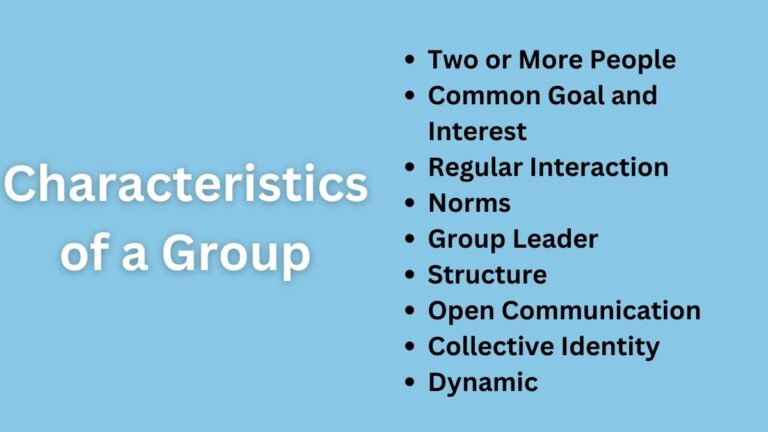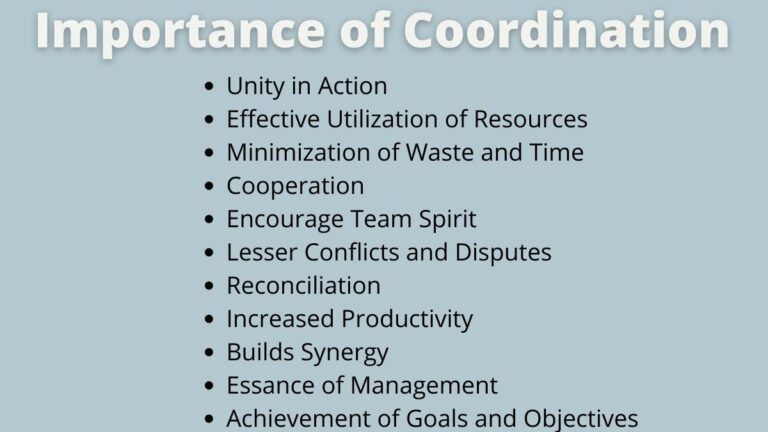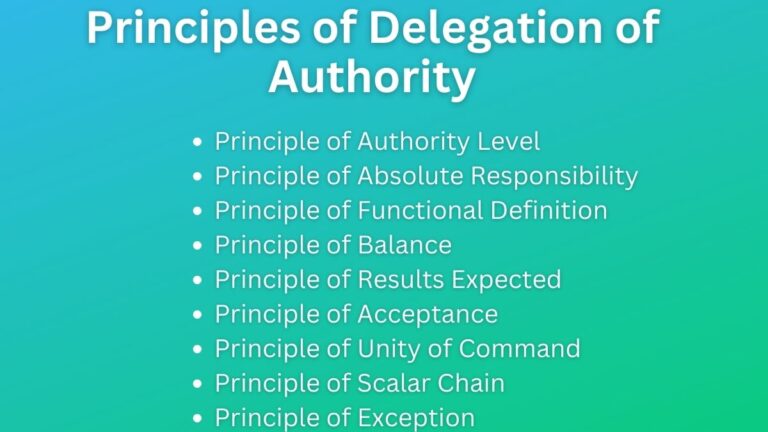What is Management? Definition, Features, Functions, Principles, Importance, & Challenges
Daily one or many organizations are being established. They operate for a few years successfully but most are failing. In most cases, their failure is the result of the mismanagement of resources they have or inefficient management practices.
Here, I will explain everything about management, what is it, what are its principles, levels, functions, and importance.
What is Management?
Management is the set of actions a manager takes to optimally utilize all organizational resources to achieve desired goals and objectives most effectively and efficiently.
The main objective of management is to let managers achieve defined goals and objectives through its essential functions like planning, decision-making, organizing, directing, staffing, and controlling.
It is a global phenomenon. It is found in every organization. The fundamental success factor of every organization is how it manages its resources including men (employees), materials, machines, methods, money, and markets. Effective coordination of these resources with the desired objectives determines whether the organization archives its goals or not.
If we break the word management as “manage-men-t” – this gives us meaning as it is an art of managing men (people, or say employees) tactfully. It acts as blood for an organization, as we need blood to operate our body, every organization needs it to successfully run its operations.
In our daily life, we use the word “management” to indicate managing things but in professional life, it indicates also achieving desired goals and objectives wisely. Now, it is not just an action, it is defined in various ways as a
- Action
- Process
- Discipline
- Subject
- Activity
- Group
- Science
- Art
- Profession
- and, many more.
It is a fundamental aspect of every organization’s success.
Characteristics of Management
It is a multi-characteristic discipline. The major characteristics/features are:
Goal Oriented
It is goal-oriented. Every activity and action taken by management is an attempt to accomplish the pre-determined goals of the organization.
Universal Function
It is universal in a way that it is applicable everywhere and found in every firm whether big, medium, or small.
Art and Science
It is art in the sense that it requires skills, experience, and the ability to perform various managerial functions. And, science in a way has different principles which are based on scientific processes and procedures.
Flexible
It is flexible in nature. The managerial actions taken today might not align with the future environment. It ensures managerial actions should be modifiable with changing environment of society.
In addition, other various characteristics of management can be pointed out below:
- Social process
- Distinct process
- Continuous process
- A profession
- Multi-disciplinary in nature
- Group activity
- Efficiency and effectiveness
- Environmental influence
- Intangibility, etc.
Principles of Management
Managerial principles are fundamental rules a manager should consider in order to successfully run his organization and achieve what he works for effectively and efficiently.
There are 14 superb principles of management introduced by Henri Fayol which are universally applicable in all organizations. They are:
- Principle of Division of Work – It focuses on work specialization as such one should be given tasks based on his/her experience and ability only.
- Authority and Responsibility – The given authority and responsibility should be balanced otherwise there will be a misuse of any of the two.
- Discipline – It refers to obeying and respecting the rules and regulations of the organization.
- Unity of Command – It states one employee should have only one boss at a time.
- Unity of Direction – It states that there should be only one head, one plan, and one boss for a similar group of activities.
- Subordination of Individual Interest to General Interest – This principle emphasizes an organization’s common interest rather than the individual interest of employees.
- Remuneration of Personnel – It ensures there should be fair pay to all employees.
- Centralization and Decentralization – Centralization means having decision-making authority only at the top and decentralization means having low-level employees also.
- Scalar Chain – This states an unbroken chain from superior to subordinate levels.
- Order – Order implies putting the right man in the right place.
- Equity – Equity is fairness in every situation.
- Stability of Tenure – This refers to the job security of employees.
- Initiative – According to this principle, every manager and employee should be encouraged to be creative with new ideas and ways of doing things.
- Spirit de Corps – This refers to “teamwork” and “Strength in Unity”.
Functions of Management
There are different functions management has to work on. As it is a process, these functions start from setting plans about what ultimately an organization wants to achieve and ultimately accomplishing them through proper evaluation and control.
The functions are:
Planning and Decision Making
Planning is deciding today what to achieve and how it will be achieved. It is looking at the future deciding how to get there and nurturing the predetermined goals.
Planning is an essential function of a manager. He should develop a feasible plan that can be achieved with the resources the organizations have.
And, decision-making is the selection of the best alternatives out of many available. For fruitful results, the right decision is a must to make.
Organizing
Organizing means creating structure in the organization. It aims at establishing an effective working relationship between employees, jobs, and units of the organization.
In simple words, organizing involves division of work, setting work rules and commitment, designing responsibility structure, and creating channels of communication, and coordination mechanisms.
Staffing
Staffing is the process of searching and evaluating new candidates to make them fit the vacant position and build working relationships with current or existing employees.
The main objective of staffing is to maintain the right person for the right job.
Directing
Directing refers to guiding, instructing, inspiring, communicating, and supervising subordinates for effective and efficient performance toward organizational interest.
For effective direction, directing consists of leadership, communication, motivation, and supervision.
Controlling
Controlling is the process of correcting the performance of different organizational units to improve the overall performance for goal achievement.
It measures the standard performance with actual performance, finds out deviations, and suggests corrective action in order to improve and keep implemented plans in the right direction.
Levels of Management
There are three levels of management also known as a managerial hierarchy. Managerial hierarchy is an unbroken line or status from highest to lowest and vice versa.
It is an important measure to establish a formal relationship between authority and responsibility in management. In doing so, different authorities and responsibilities are divided into these various levels.
Top-Level Management
This is the highest level of managerial hierarchy. The Board of directors, chief executive officer, managing director, president, chairperson, etc. are the common titles of the top level of the managerial hierarchy.
The task of the top level is to set the overall direction of the organization such as setting strategic plans, policies, and strategies to establish coordination among members for efficient achievement of predetermined goals. Then set plans and policies are then transferred to subordinate levels for implementation.
Also Read: What is a Product? Definition, Characteristics, Types, Levels, and Importance
Middle-Level Management
The middle level lies between the top-level and lower-level management. This is the department level of the organization which is formed to conduct similar activities where different departments are created such as marketing, finance, production, procurement, sales, and other similar position.
The main task of this level is to implement plans and policies developed by the top level through guiding, instructing, and controlling lower levels.
Lower-Level Management
This is the lowest level also known as the operational level of management hierarchy which is directly related to the implementation of plans and policies. The operating level is strongly responsible for day-to-day activities which ensure short-term goal achievement.
The common operational positions are supervisors, foremen, sales officers, account officers, etc. They have a direct relationship with employees involved in operations and are responsible to assign them required responsibilities and duties.
Importance of Management
Why management is important? After reading the above-discussed matter you probably are well known about how crucial management is for an organization.
Management is the foundation of organizational success. For every organization to succeed, it needs proper planning, well-managed employees, optimum utilization of resources, coordination, effective leadership, and so forth which is ensured by this.
Moreover, the importance of management can also be pointed out below:
- Set proper plans
- Effective utilization of resources (finance, employees, organizational resources)
- Brings coordination
- Effective decision-making
- Effective controlling
- Staffing
- Effective supervision
- Environmental adaptability
- Effective direction
- Goals accomplishment, etc.
Challenges in Management
Although it is a success factor for companies managers have to confront various challenges to make it best work. Some of the challenges are:
Globalization
Now the world has become a global village. Management has to intentionally or unintentionally compete with global products which can cause a great challenge to a domestic company. Making strategies that can compete with or defeat global products is a must for today’s managers.
Workforce Diversity
Workforce diversity refers to employees’ differences in terms of education, skills, experience, attitude, gender, religion, etc. As employees possess various characteristics managing them to make their efforts to organizational interest is a challenging task for a manager.
Employee Empowerment
Employee empowerment refers to giving employees certain autonomy to perform the given tasks. This makes them work in their way but managers have to carefully think about to what extent autonomy should be given.
Work-Life Balance
Employees give their best of best efforts when they feel their personal life is also valued along with their professional life. Managers should make a positive difference in employees’ life outside the organization.
Dynamic Environment
The environment is dynamic managers have to create plans and policies that can adapt to change brought by the environment. Adapting to the changes is necessary but it is a challenge.
In conclusion…
We can conclude that management is the process of getting things done through and with other people by using resources (human, financial, information, and physical) with the help of its basic functions (planning, decision-making, organizing, staffing, directing, and controlling). It is desirable to every organization.
Sajan Kushmi is a content writer with more than 4 years of experience. He holds BIM Degree. He write on the topics related to Management, Marketing, and Entrepreneurship.






